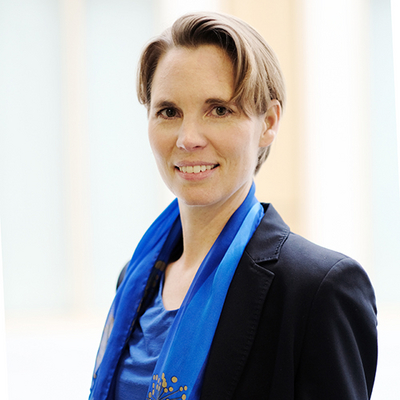Dorothee Dormann awarded an ERC Consolidator Grant
PRESS RELEASE
Dorothee Dormann, an Adjunct Director at the Institute of Molecular Biology (IMB) and a Professor of Molecular Cell Biology at Johannes Gutenberg University (JGU) in Mainz, Germany, has been awarded a Consolidator grant worth €2 million by the European Research Council (ERC). The funds will be used to further her research on protein aggregates that are linked to neurodegenerative diseases of ageing.
Dorothee’s research focuses on the protein TDP-43, which is present in all the cells of our body. However, TDP-43 can aggregate into large clumps in the brain, and this process can cause degenerative diseases such as Alzheimer's and other dementias, which often affect the elderly. How exactly this happens and how these protein clumps are linked to disease is a subject of great interest.
Dorothee suspects that these proteins may also assemble in healthy cells – and that this assembly on a much smaller scale is important for the normal function of the TDP-43 protein. Her research group investigates the reason for these assemblies in the "TDP Assembly" project. Now, the European Research Council has awarded Dorothee an ERC Consolidator Grant for the project. At €2 million, this is one of the EU's most prestigious and valuable grants, awarded to outstanding individual scientists working on ground-breaking research.
Dorothee’s preliminary work indicates that smaller assemblies of TDP-43 proteins could play an important role in the cell’s regulatory processes – for example in the reading of genetic information and RNA production. Using methods from synthetic biology, she aims to artificially trigger various TDP-43 assemblies and investigate the resulting changes in cells. "The aim is to understand both the normal assembly process in healthy cells and the changes that lead to degenerative diseases when the assemblies become too large or too solid," explains Dorothee. Such abnormal protein clumps not only cause problems in the brain, but also lead to a malfunction of the regulatory processes that the smaller assemblies normally carry out. What consequences could occur if small TDP-43 assemblies are lost? Dorothee’s research will also address this question.
This research is especially important for developing future drugs to treat neurodegenerative diseases and thereby promote healthy ageing. For example, drugs that prevent the aggregation of TDP-43 may also interfere with the smaller TDP-43 assemblies that are important for the body. A precise understanding of the functions of TDP-43 assemblies is therefore necessary, as well as a knowledge of how the assembly process can be controlled from the early stages to the formation of large aggregates.
Further details
Further information can be found at https://erc.europa.eu/news-events/news/erc-2023-consolidator-grants-results
Dorothee Dormann is an Adjunct Director at IMB and a Professor of Molecular Cell Biology at Johannes Gutenberg University Mainz. Further information about research in the Dormann lab can be found at www.imb.de/dormann.
About the Institute of Molecular Biology gGmbH
The Institute of Molecular Biology gGmbH (IMB) is a centre of excellence in the life sciences that was established in 2011 on the campus of Johannes Gutenberg University Mainz (JGU). Research at IMB focuses on the cutting-edge fields of epigenetics, genome stability, ageing and RNA biology. The institute is a prime example of successful collaboration between a private foundation and government: The Boehringer Ingelheim Foundation has committed 154 million euros to be disbursed from 2009 until 2027 to cover the operating costs of research at IMB. The State of Rhineland-Palatinate has provided approximately 50 million euros for the construction of a state-of-the-art building and is giving a further 52 million in core funding from 2020 until 2027. For more information about IMB, please visit: www.imb.de.
About the Centre for Healthy Ageing
The Centre for Healthy Ageing (CHA) is a virtual research centre launched in 2021 that brings together scientists in basic and clinical research from across Mainz that focus on ageing and age-related diseases. These findings should be used to promote healthy ageing and to find treatments that could prevent or cure age-related disease. For more information, please visit: www.cha-mainz.de.
About Johannes Gutenberg University Mainz
Johannes Gutenberg University Mainz (JGU) is a globally recognized research-driven university with around 31,000 students from over 120 nations. Its core research areas are in particle and hadron physics, the materials sciences, and translational medicine. JGU's success in Germany's Excellence Strategy program has confirmed its academic excellence: In 2018, the research network PRISMA+ (Precision Physics, Fundamental Interactions and Structure of Matter) was recognized as a Cluster of Excellence – building on its forerunner, PRISMA. Moreover, excellent placings in national and international rankings as well as numerous honors and awards demonstrate the research and teaching quality of Mainz-based researchers and academics. Further information at www.uni-mainz.de/eng
Boehringer Ingelheim Foundation
The Boehringer Ingelheim Foundation is an independent, non-profit organization that is committed to the promotion of the medical, biological, chemical, and pharmaceutical sciences. It was established in 1977 by Hubertus Liebrecht (1931–1991), a member of the shareholder family of the Boehringer Ingelheim company. Through its funding programmes Plus 3, Exploration Grants and Rise up!, the Foundation supports excellent scientists during critical stages of their careers. It also endows the international Heinrich Wieland Prize, as well as awards for up-and-coming scientists in Germany. In addition, the Foundation funds institutional projects in Germany, such as the Institute of Molecular Biology (IMB) and the European Molecular Biology Laboratory (EMBL) in Heidelberg.
Press contact for further information
Dr Ralf Dahm, Director of Scientific Management
Institute of Molecular Biology gGmbH (IMB), Ackermannweg 4, 55128 Mainz, Germany
Phone: +49 (0) 6131 39 21455, Email: press(at)imb.de
